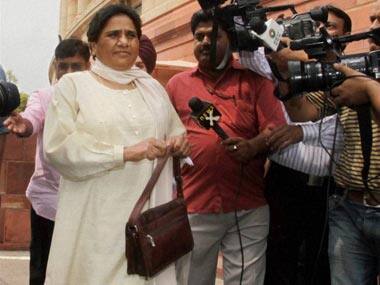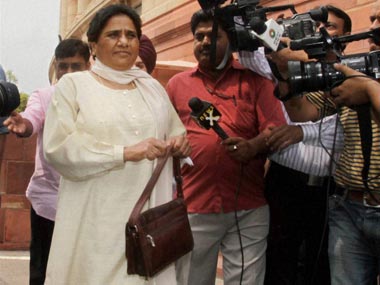A writ petition filed with the Lucknow bench of the Allahabad High Court on Monday has cast doubts over the integrity of the Central Bureau of Investigation (CBI) and alleged that an ex-Governor of Uttar Pradesh, TB Rajeshwar, acted as an ‘agent’ of the Congress and the Central Government in 2007 by rescuing former UP Chief Minister Mayawati and her cabinet minister Naseemuddin Siddiqui in the Taj Corridor case. Mayawati as CM had initiated a plan to beautify the Taj Mahal area in Agra by reclaiming land from the Yamuna river by changing its course. On allegations of huge financial bungling, the Supreme Court had ordered a CBI investigation and had asked the agency to place its charge-sheet along with the evidence before it. Instead, the writ petition alleges, the CBI itself sought to seek the sanction of the UP Governor under section 197 of the CrPC, who denied it. “The CBI, in a highly stage-managed manner, filed the charge-sheet before the concerned court, which, on the pretext that the CBI has not been able to procure the necessary sanction under Section 197 CrPC, refused to take cognisance and issue process’’, says the petition. [caption id=“attachment_545771” align=“alignleft” width=“380”]
 The writ petition says that it seeks to “highlight the well-entrenched nexus of the corrupt politicians and the constitutional functionaries to scuttle a legitimate prosecution by abusing their respective powers.’’ PTI[/caption] The writ petition says that it seeks to “highlight the well-entrenched nexus of the corrupt politicians and the constitutional functionaries to scuttle a legitimate prosecution by abusing their respective powers.’’ The CBI suo moto decided to seek a ‘sanction’ for prosecution in the Supreme Court-monitored Taj Corridor case when it was required to present its charge-sheet to the Supreme Court. And Rajeshwar’s order was “patently tainted with malafide because when the CBI had collected sufficient evidence in support of its case against Ms Mayawati and Sri Naseemuddin Siddiqui, who were at that time holding the posts of CM and cabinet minister respectively, there was hardly any space for the Governor to have applied his mind in the matter.’’ The petition alleges that the Congress had appointed Rajeshwar as new Governor to solicit the support of Bahujan Samaj Party’s Mayawati. “As a quid pro quo gesture, the members of the Congress Party had offered to bail out Ms Mayawati and her associate, Sri Naseemuddin Siddiqui, in the pending criminal proceeding related with the Taj Corridor.’’ The petition questions: “What was the reason for the Governor (Rajeshwar) to seek the advice of the Additional Solicitor General of India, who is not the law officer of the state of UP? It is pertinent to mention that while considering the question to accord sanction, the Governor exercises the executive power of the state and not as an agent of central government (and certainly not as an agent of any political party).” Thus, the petition alleges that there is “malice in law in the action of the Governor.’’ Rajeshwar acted as an Appellate Authority by rejecting every piece of evidence collected by the CBI to rescue Mayawati. “It is noteworthy that the Governor’s power under Section 197 is not in the nature of judicial review, but an administrative power and limited to the extent to examine whether the act done by the public officer has been done in the discharge of official duty,’’ the petition says, adding that Rajeshwar has acted beyond his jurisdiction in the Supreme Court-monitored CBI investigations. Thus the petition seeks a quashing of the Governor’s order, as it is allegedly malafide, arbitrary without jurisdiction and passed on extraneous consideration.
The writ petition says that it seeks to “highlight the well-entrenched nexus of the corrupt politicians and the constitutional functionaries to scuttle a legitimate prosecution by abusing their respective powers.’’ PTI[/caption] The writ petition says that it seeks to “highlight the well-entrenched nexus of the corrupt politicians and the constitutional functionaries to scuttle a legitimate prosecution by abusing their respective powers.’’ The CBI suo moto decided to seek a ‘sanction’ for prosecution in the Supreme Court-monitored Taj Corridor case when it was required to present its charge-sheet to the Supreme Court. And Rajeshwar’s order was “patently tainted with malafide because when the CBI had collected sufficient evidence in support of its case against Ms Mayawati and Sri Naseemuddin Siddiqui, who were at that time holding the posts of CM and cabinet minister respectively, there was hardly any space for the Governor to have applied his mind in the matter.’’ The petition alleges that the Congress had appointed Rajeshwar as new Governor to solicit the support of Bahujan Samaj Party’s Mayawati. “As a quid pro quo gesture, the members of the Congress Party had offered to bail out Ms Mayawati and her associate, Sri Naseemuddin Siddiqui, in the pending criminal proceeding related with the Taj Corridor.’’ The petition questions: “What was the reason for the Governor (Rajeshwar) to seek the advice of the Additional Solicitor General of India, who is not the law officer of the state of UP? It is pertinent to mention that while considering the question to accord sanction, the Governor exercises the executive power of the state and not as an agent of central government (and certainly not as an agent of any political party).” Thus, the petition alleges that there is “malice in law in the action of the Governor.’’ Rajeshwar acted as an Appellate Authority by rejecting every piece of evidence collected by the CBI to rescue Mayawati. “It is noteworthy that the Governor’s power under Section 197 is not in the nature of judicial review, but an administrative power and limited to the extent to examine whether the act done by the public officer has been done in the discharge of official duty,’’ the petition says, adding that Rajeshwar has acted beyond his jurisdiction in the Supreme Court-monitored CBI investigations. Thus the petition seeks a quashing of the Governor’s order, as it is allegedly malafide, arbitrary without jurisdiction and passed on extraneous consideration.
Taj corridor: PIL seeks to reopen case against Mayawati
Raman Kirpal
• December 5, 2012, 10:55:44 IST
A PIL in Allahabad has cast doubts over the integrity of CBI and alleged that an ex-Governor of UP acted as an ‘agent’ of the Congress and the Central Government in 2007 by rescuing Mayawati in the Taj Corridor case.
Advertisement
)
End of Article